December 6, 2013
How many times do you vote for someone who doesn't sit in
parliament? Would you like to see your vote reflected in the members that form
our national government?Nancy Carswell, from Fair Vote Canada, spoke to the Quill Plains Chapter of Council of Canadians in Wynyard on November 30, 2013.
Canadians believe that they live in a democratic country. The whole purpose of democracy is to ensure that government represents and is accountable to – must answer to – the people it governs. In a representative democracy, the voting system actually creates the foundation for the entire political system.
And what happens when you have a system that ignores such a large portion of votes? Not surprisingly – the overall election results become quite distorted. Millions of voters are saying one thing with their ballots, and the voting system is giving them something very different – distorted results. A party can get as little as 35% of the votes, gain a majority of seats and wield 100% of the power with no representation from the other 65% of voters. Ms Carswell gave the classic provincial case in New Brunswick in 1987. Frank McKenna’s Liberals won 60% of the votes, and captured 100% of the seats. The voting system denied any representation whatsoever for the other 40% of the voters.
The other thing that happens in our current system is that voters lose interest – don't vote because “it won't make a difference” and young people don't even get started.
The question is: how do we fix it? Where do we start?
We can use a fair voting system – or what is usually called proportional representation (PR) - any voting system designed to produce a representative body (like a parliament, legislature, or council) where voters elect representatives in proportion to our votes.
Did you know that proportional representation is used by far
more countries than our current “first-past-the-post” method? It is not a wild
and crazy political experiment – taking us into unexplored territory. More than
eighty countries use PR; it works for Germany, for example, one of the most
progressive and most stable economies in the world.
In a democracy, parliamentary representation is a
fundamental right of all citizens. And it is not a prize that we win or lose in
a contest – that contest being an election where we elect our MPs. That second
point is critically important – because Canada uses a voting system for
parliamentary elections that divides voters into those who win parliamentary
representation and those who lose that right.
A number of changes would have to occur; ridings would
become larger and ballots would be larger and more complicated. When we entered
the polling booth, a ballot would allow us to choose our party, and choose from
a list the candidates that we wanted to represent ourselves. New Zealand tried
PR for a “trial period” over a decade ago and liked it so well that they kept
it.
There are many ways to design PR: Closed lists: voters vote
for a party, candidates elected in the order presented on the ballot; Open
lists: voters can indicate their choices for individual candidates within their
preferred party; Single Transferrable Vote (STV): voters rank candidates from
any party; Mixed system: voters elect a single MP from their local riding (like
we do now) plus also elect at-large MPs from party lists - both of which will fill seats to ensure
each party has a fair portion of seats in parliament.
It is important to understand these things: Voter equality
means that each MP should be elected by and represent roughly the same number
of people – e.g., one MP for every 100,000 people. But that doesn’t mean every
electoral district has to be the same size and have the same number of MPs. For
example, in rural and remote areas where voters are scattered over a large
region, an electoral district might have 300,000 people and elect 3 MPs. In
densely-populated, urban centres, you might have a district with 500,000 people
who elect 5 MPs, or 700,000 who elect 7 MPs.
Ms Carswell closed her presentation with the words of Swiss
philosopher, Ernest Naville, who, in 1865, summarized it this way: “The right
of decision belongs to the majority, but the right of representation belongs to
all.”
“Make electoral reform a key issue in the 2015 federal
election!” Ms Carswell says. Fair Vote Canada is a national multi‐partisan
citizens’ organization pressing for the adoption of fair and proportional
voting systems at all levels of government.
Written by Elaine Hughes, Chairperson, on behalf of the
members of the Quill Plains Chapter of the Council of Canadians.






